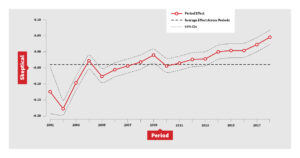 Awair, an authorized Hogan distributor in Italy, Spain, and France, hosted an event on November 14 in Milan attended by nearly 50 members of the Italian community of Hogan Certified talent management experts. The lively session allowed participants to network, expand their knowledge of Hogan competencies, and to share experiences.
Awair, an authorized Hogan distributor in Italy, Spain, and France, hosted an event on November 14 in Milan attended by nearly 50 members of the Italian community of Hogan Certified talent management experts. The lively session allowed participants to network, expand their knowledge of Hogan competencies, and to share experiences.
Over the years, the community of certified people has been growing significantly, and many of the participants have shown interest in meeting and exchanging ideas. With facilitation by Andrea Facchini, Awair Partner and Hogan expert, Awair launched the first Italian Hogan Certified Community, with a remarkable turnout of people ready to share their Hogan knowledge at the November 14 event.
During the meeting, Andrea introduced three main topics requested by participants via survey (Report Selection: How to choose the most appropriate Hogan product. Feedback & delivery: Sharing success and stories and lessons learned, as well as tips for more creative and efficient feedback. Report interpretation: How to handle critical profiles and to look at interdimensional conflicts from a different angle) and then opened the floor to the participants for continued interaction and discussion.
The benefits of being part of the community include:
- Keeping your Hogan knowledge up-to-date
- Advancing by learning from practical, real examples
- Meeting like-minded people, listening, and sharing experiences
- Expanding your professional network
For those who are not certified, Hogan Certification allows attendees to develop a deep knowledge and understanding of the tools. By leveraging the predictive power, use of the assessments can boost organizational performance by identifying and addressing both the individual and the organizational development areas. But that’s not all: Hogan Certification provides participants with a set of skills that changes their way of looking at the nature of human nature.
Awair has organized Hogan Certification Programs in Milano and Roma since 2015, and has certified over 400 HR experts, including HR professionals at several levels, as well as talent management consultants, coaches, and psychologists.
The meeting on November 14 was a pilot and the feedback was so positive and enthusiastic that more meetings have been scheduled for 2019 in Italy. Also, keep an eye out for the launch of a Hogan Certified Community in France and Spain as well.


 Nicole Neubauer, CEO of
Nicole Neubauer, CEO of 
 Opinions on President Donald Trump run strong, to say the least. Whether you believe he will make America great again or single-handedly destroy it, there’s one aspect of Trump everyone can agree on – he knows how to dominate the news.
Opinions on President Donald Trump run strong, to say the least. Whether you believe he will make America great again or single-handedly destroy it, there’s one aspect of Trump everyone can agree on – he knows how to dominate the news.

 In this era of Big Data, simply producing or collecting nearly unfathomable amounts of data isn’t enough. The best companies are able to sift through that data to find meaningful trends and, ultimately, specific information that sparks a plan of action.
In this era of Big Data, simply producing or collecting nearly unfathomable amounts of data isn’t enough. The best companies are able to sift through that data to find meaningful trends and, ultimately, specific information that sparks a plan of action. Today, amateur and professional trolls work to stir up arguments and divisiveness. Casual social media discussions frequently devolve into arguments with all kinds of questionable bits of information casually thrown around like wadded-up paper balls. Did the Pope really endorse Donald Trump? Is Kid Rock really running for Senate? Time to run to a fact-checking website – but how many people will trust what they say?
Today, amateur and professional trolls work to stir up arguments and divisiveness. Casual social media discussions frequently devolve into arguments with all kinds of questionable bits of information casually thrown around like wadded-up paper balls. Did the Pope really endorse Donald Trump? Is Kid Rock really running for Senate? Time to run to a fact-checking website – but how many people will trust what they say?
 *This post was authored by Hogan’s Michael Tapia, Dena Rhodes, and Ryne Sherman.
*This post was authored by Hogan’s Michael Tapia, Dena Rhodes, and Ryne Sherman.